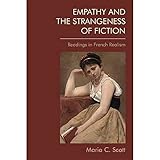Empathy and the Strangeness of Fiction : Readings in French Realism / Maria C. Scott.
Material type: TextPublisher: Edinburgh : Edinburgh University Press, [2022]Copyright date: ©2020Description: 1 online resource (240 p.)Content type:
TextPublisher: Edinburgh : Edinburgh University Press, [2022]Copyright date: ©2020Description: 1 online resource (240 p.)Content type: - 9781474463034
- 9781474463058
- 809/.93353 23
- online - DeGruyter
| Item type | Current library | Call number | URL | Status | Notes | Barcode | |
|---|---|---|---|---|---|---|---|
 eBook
eBook
|
Biblioteca "Angelicum" Pont. Univ. S.Tommaso d'Aquino Nuvola online | online - DeGruyter (Browse shelf(Opens below)) | Online access | Not for loan (Accesso limitato) | Accesso per gli utenti autorizzati / Access for authorized users | (dgr)9781474463058 |
Browsing Biblioteca "Angelicum" Pont. Univ. S.Tommaso d'Aquino shelves, Shelving location: Nuvola online Close shelf browser (Hides shelf browser)

|

|

|

|

|

|

|
||
| online - DeGruyter Exploring the Ecology of World Englishes in the Twenty-first Century : Language, Society and Culture / | online - DeGruyter The Scots Afrikaners : Identity Politics and Intertwined Religious Cultures / | online - DeGruyter Beckett and Embodiment : Body, Space, Agency / | online - DeGruyter Empathy and the Strangeness of Fiction : Readings in French Realism / | online - DeGruyter No Power Without an Image : Icons Between Photography and Film / | online - DeGruyter Samuel Beckett and Technology / | online - DeGruyter Shakespeare's Essays : Sampling Montaigne from Hamlet to The Tempest / |
Frontmatter -- Contents -- 1. Does Reading Fiction Boost Empathy? Psychological Approaches -- 2. Literary Approaches to Empathy -- 3. Fictional Strangers and the Strangeness of Fiction -- 4. Balzac: The Limits of Transparency and the Dangers of Opacity -- 5. Stendhal and the Two Opposing Demands -- 6. Sand and the Necessity of Suspicion -- 7. Towards an Empathetic Ethics of Fiction-Reading -- Bibliography -- Index
restricted access online access with authorization star
http://purl.org/coar/access_right/c_16ec
Explores how and why narrative fiction engages empathy, including Theory of MindOffers a broad overview of current scientific work on the effects of fiction-reading on empathy, including Theory of MindProvides an original intervention in the field of literary theory, centring on the reflexive properties of the fictional strangerIncludes stand-alone close readings of three novels by important French authorsThis book takes its point of departure in recent psychological findings which suggest that reading fiction cultivates empathy, including Theory of Mind. Scott draws on literary theory and close readings to argue that engagement with fictional stories also teaches us to resist uncritical forms of empathy and reminds us of the limitations of our ability to understand other people. The book treats figures of the stranger in Balzac’s La Fille aux yeux d’or, Stendhal’s Le Rouge et le Noir and Sand’s Indiana as emblematic of the strangeness of narrative fiction, which both draws us in and keeps us at a distance.
Mode of access: Internet via World Wide Web.
In English.
Description based on online resource; title from PDF title page (publisher's Web site, viewed 27. Jan 2023)


